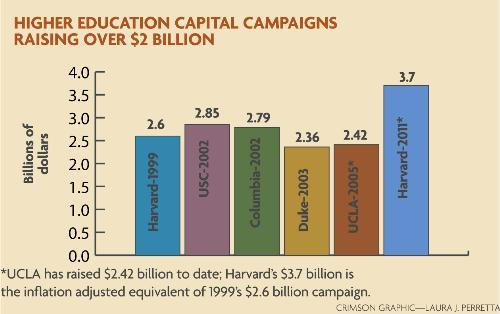With Harvard’s largest curricular review in 25 years and its largest physical expansion in history underway, the University is preparing to set another record—the most ambitious capital campaign in the history of higher education.
Officials running the fundraising drive, which is slated to officially begin later this year, say it will outpace Harvard’s last University-wide campaign, which finished at $2.6 billion and at the time was nearly $1 billion larger than any other completed higher education campaign.
The campaign will try to attract donors to fund some of University President Lawrence H. Summers’ oft-repeated goals, which include revamping undergraduate education, creating ambitious new science programs, developing the University’s campus of the future in Allston and supporting public service careers.
Summers himself just returned from a two-day development trip in New York City, where he said he floated early plans for the campaign with potential donors.
Vice President for Alumni Affairs and Development Donella Rapier said that in contrast to the last campaign, which placed more focus on the goals of individual schools, Summers plans to emphasize University-wide and cross-faculty initiatives in his fundraising efforts.
None of the specific details of the campaign have been officially hammered out, Rapier says.
“The total dollar goal is not decided, the time is not decided,” she says. “So we’re really in the very, very early planning stages.”
But she says that Harvard has committed to beating 1999’s $2.6 billion figure by more than inflation. This means that—based on a higher-education inflation rate of 3 percent and adjusted for inflation through the end of the campaign’s potential seven-year length—the goal will be to take in at least $3.7 billion, or $850 million more than the largest currently finished campaign, conducted by the University of Southern California and completed in 2002.
Development officials and senior administrators are beginning to discuss the campaign with major donors. Rapier outlined campaign plans to the approximately 90 alumni directors at a meeting last month, according to Harvard Alumni Association Director Jack Reardon.
“We’re spending a lot of time and energy now on thinking about exactly what we would do and how we would do it,” Rapier says.
Summers described the University’s current activity as comprising the “pre-quiet phase” of the campaign.
This campaign will begin five years after the close of the previous campaign, which ran from 1992 to 1999. Administrators and faculty said at the time of former President Neil L. Rudenstine’s retirement that his prodigious fundraising efforts would relieve his successor of the need to lead another campaign in the near future.
But Summers began mulling a campaign just a year into his tenure. Now, only two years after Rudenstine’s departure, he committed to a major campaign, a testament to the fact that the billions required to fund major science projects or move entire graduate schools to Allston will far exceed Harvard’s current resources.
Rapier, who was promoted this fall from her position as chief financial officer at Harvard Business School (HBS), was hired largely with a mandate to oversee the coming campaign, she says.
“A large part of what I’ve been hired to do is figure this out,” she says.
Read more in News
Chapel May Remain in Cambridge Permanently













